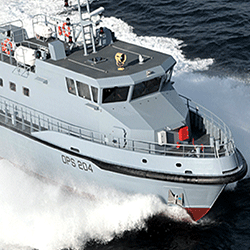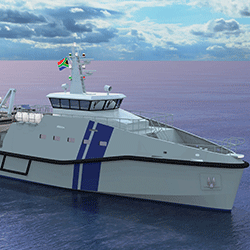Vital Stats
- Founder: James Fisher
- Company: Nautic Africa
- Launched: 2008
- Previous experience: Invented the Snakeboard while still in college; launched Cape Advanced Vehicles (CAV) to build GT40 race cars
- Start-up capital: None
- Current turnover: An order book of R600 million
Serial entrepreneur. Maverick innovator. Mastermind behind the Snakeboard. GT40 and Shelby Cobra racing car manufacturer. Responsible for the first ships in their class to be designed and built in South Africa. Local boy made good.
James Fisher is all of these things.
But he’s also the man who has regrets about the way he listed his first company on the London Stock Exchange, the founder of another company that tanked badly and a businessman with many failures under his belt.
These days he’s a little bit more cynical, quite a bit older and a whole lot wiser. And he’s put past lessons to good use building Nautic Africa, a marine company started without a single cent, that has zero debt and an order book of over R600 million.
This is his story.
Inventing is in James Fisher’s DNA. As a youngster he’d consciously invest time in thinking about how to come up with a better version of an existing product, or better yet, an entirely novel product that would be ‘the next big thing’.
His efforts paid off when he invented the Snakeboard in 1989 along with school friend Oliver Macleod Smith. It was the biggest thing to happen to skateboarding since the skateboard and it made Fisher millions. The Snakeboard won the Popular Science Worldwide Product of the Year in 1992. Fisher and Macleod Smith listed the company on the London Stock Exchange, defying everyone who’d berated him for leaving university mid-degree to pursue what most saw as a harebrained pipe-dream.
He sold the snakeboard patents in 1995, the company in 1999 and moved on to his next venture – building GT40 racing cars locally in South Africa as part of Cape Advanced Vehicles (CAV), teaming up again with Macleod Smith and new partner Owen Ashley.
These days you’ll find him at the helm of Nautic Africa, a specialist maritime vessel design and construction company that supplies naval fleets and other vessels to customers around the world.
“I wouldn’t be so bold as to say I was born with business acumen. That’s not true. But if you are smart enough to learn the lessons early on, you will find yourself on the right track. It‘s a school of hard knocks but you do learn fast when you’re young and you’re prepared to go out there and try,” he says.
Fisher was nothing if not prepared to ‘go out there and give it a try’. He clearly remembers the family rumpus that erupted when he threw aside his university degree to follow his Snakeboard dream to the United States. “The move to the US at the time was not bought into by the whole family,” he jokes.
And being ready to get stuck in means he’s had his fair share of lessons. “Failure,” he says, “is – fortunately or unfortunately, depending on your take – a vital part of the learning curve.”
My most important lessons come from my two biggest failures
The first – surprisingly, given its meteoric success – relates to the Snakeboard.
Convinced by the market makers that they needed a prestigious board of directors when they listed in London, Fisher and Macleod handed over management control to a board that didn’t understand the product.
Fisher explains, “At the end of the day Oliver and I owned 51% of the company but we had no control over it. We handed everything over. Amongst other things we wanted to target the sports market and they felt it was more a cheap toy product to drive volume and revenue without consolidating the product, brand and integrity. The spirit we created wasn’t carried through and our stock price fell quite dramatically. Essentially, we lost our baby.”
The lesson was that you cannot hand over the reins of your company to people who don’t understand the intrinsic value and integrity of the product.
But he blames no one other than himself. “We managed it badly. We saw dollar signs and were happy to get some money out and float the company. It was enormously prestigious for youngsters in their mid 20s. We were on the front cover of the Financial Times in London. It was a great experience for us and I never regret it, but the failure for me was handing it over in such an inexperienced manner to people who didn’t understand the business,” he says.
Although he and Macleod retained majority equity, the experience raises questions many other entrepreneurs have about giving away ownership of a growing company. How much is too much?
“The question reminds me of something Raymond Ackerman said. He was in a position where he had to raise funding and his investors were very happy to put money into the business, but they wanted to take what would end up being majority equity. He convinced them that in fact they didn’t want that, because as his investors it was better for them if he was still in control of the business and driving it with passion that can only come from ownership. I think there is a lot of merit in that,” says Fisher.
The lesson about handing over ownership has stuck with him. He hasn’t given away a single share in Nautic Africa. Key staff incentives are imperative and Fisher does reward his team commensurate with good performance.
Equity deals may be on the horizon for Nautic in future, but these will be driven by purely strategic reasons – to open doors, unlock opportunities, take the business to the next level. But not necessarily to raise funding.
“At some point you are going to need to give away equity and that’s okay if it’s for the right reasons, but my advice would be to hold on to as much as you can for as long as you can. Investors – and I count myself among them – don’t need control. They should be investing in you as the entrepreneur, not trying to get you out of the way,” he adds.
That’s all very well but what do you do if you don’t have funding?
Well, here’s the thing. Nautic Africa was started without a single cent of Fisher’s – or anyone else’s money. It has been completely self-funded and to this day is 100% debt-free. And it’s not as if ship-building is a low capital requirement business. “It can take a year to build a ship and requires enormous amounts of money, so cash flow is always an issue,” says Fisher.
He got around the funding problem by leveraging off the back of an order and getting the customer to do a pre-payment.
“I kept a contract from the marine division of CAV when we sold the company and this got me into the maritime industry on the leisure side, supplying small boats to Mercury in the US. But when the leisure industry started dipping following the recession, I realised that the commercial industry was still strong. I had a client who was looking for a boat – I went and had it designed by a naval architect and outsourced the manufacture to a factory using the client’s deposit,” he explains.
Eventually an idea evolved in his mind to build more customised products for maritime customers. He got a couple of big orders and was able to set up his own facility, and has built the business from there to its point of success today.
But things weren’t always so rosy, and Fisher mentions ‘two’ big failures, so what was the second one? In answering that particular question, he’s unequivocal.
The car business was a spectacular failure. I lost millions.
“You end up pouring money into it to keep it going. I will never do that again. When things aren’t working sometimes the best thing to do is to cut it, kill it, put it to bed and start again,” he says.
Disaster struck when the rand appreciated in value from R13/$ to R5/$ – a catastrophic turn of events for a business that was 100% export and 100% local manufacture. In a classic double whammy, revenue halved while costs soared.
“The lesson for me was that you need to aggressively hedge your business all the time and build up equity. You cannot be reliant on things always being the same going forward,” Fisher says.
Looking back he knows he should’ve done certain things differently but these are all the lessons you move forward with. “The two businesses are extremely similar – we manufacture locally and sell mostly into Africa but also globally. We are now hedged from a currency risk perspective because we import around 35% of components,” he explains.
Nautic has found its ‘sweet spot’ – Africa is growing, oil and gas are booming, the company has innovative products and the people to deliver a unique service that allows it to outstrip Chinese and Turkish competitors.
“Business is about getting the formula right. It’s not actually about the product but rather about the perfect business mix – the product, the people, the service, the timing, the environment, the cash flow,” Fisher says.
That said, people still want to know what the ‘key’ is to making a success out of a winning idea.
A lot of people ask me what the magic formula is for innovation.
“They ask me to be involved in their business or innovation because they seem to think that somehow that will make it work. But that’s missing the point. I don’t have some unique secret. The secret is simply this – you can have the best product in the world, something that will turn water into fuel, but if it‘s marketed by the wrong person and there’s not a driving, singular passion behind it, it will die.”
It’s an interesting take from an ‘ideas man’ whose success has been built on innovative and ground-breaking concepts. But it‘s something Fisher sees often in his work with young innovators and inventors. The ideas that are driven passionately by dedicated entrepreneurs who have an abiding belief in their product are the ones that work. The rest don’t see the light of day.
“Everyone says it‘s about the idea but that’s just not enough. There are so many great ideas out there. The person pushing it makes the difference; in a lot of cases naïve enthusiasm is better than cynical knowledge,” he adds.
Passion is something Fisher talks a great deal about. But he balances this now with a dollop of cynicism borne of the knocks he has suffered.
“You almost have to develop cynicism so that you remain aware that failure could be just around the corner,” he says.
It’s something that’s always at the back of his mind. “Business is a daily fight for survival – even when you are not on the verge of closing up shop, you need to think of it in that way.
“There is no room for complacency. The minute you stop checking that you are still buying at the right price, getting the best deal possible, that your customers are happy – you are lost,” he says.
He adds, “I find myself coming across far more cynically to young inventors because I know it‘s not a bed of roses out there. They need to understand that. It’s not to temper their enthusiasm, but rather to temper their expectations of what is going to hit them. They have to know they are going to need to push through many, many brick walls.”
But for all his talk of being more cynical, Fisher still admits to getting ‘enormously, stupidly excited’ about new ideas. So while much has changed, much has remained the same.









